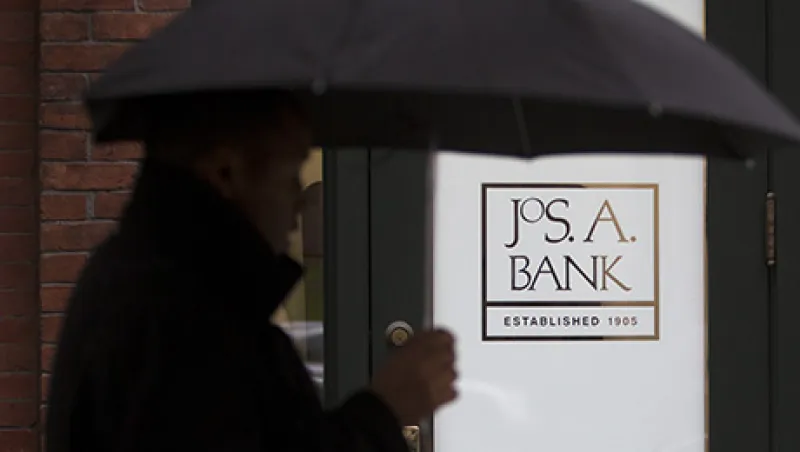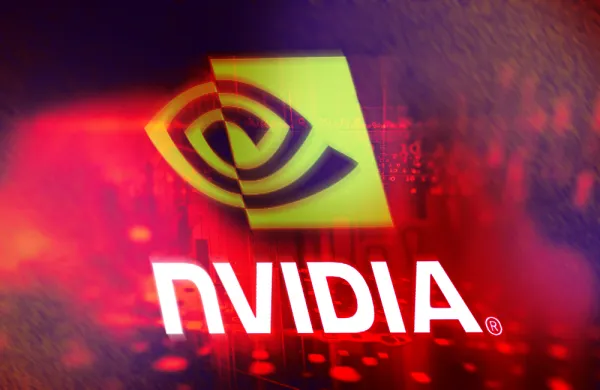In one of my better articles last year, I had the audacity to compare men’s retailer Jos. A. Bank to the all-mighty Federal Reserve. I argued that Jos. A. Bank is addicted to what was supposed to be a temporary advertising campaign — buy one suit, get (insert always-increasing number here) suits free. The Fed, on the other hand, is hooked on quantitative easing.
I’ll let you read the original article. And to the Fed, I am sorry this article is not about you (but don’t despair, there is one about you in the works).
Last June, Jos. A. Bank reported absolutely miserable numbers — no surprise there — and in October it announced its intention to buy its largest direct competitor, Men’s Wearhouse, which is more than twice its size in terms of revenue. This is when things really got interesting.
Jos. A. Bank is past the point of salvation; its advertising has ruined its brand. Today that brand stands not for the quality of its clothes but only for their quantity. In fact, the first thing that comes to mind when you see someone wearing a Jos. A. Bank suit is that he has three more just like it in the closet.
The company is trapped. It has to keep giving away more suits with every promotion to bring men back to its stores. The latest promotion was buy one, get three free.
Paraphrasing what Jim Chanos said about China at my Valuex Vail conference last year, Jos. A. Bank is on a treadmill to hell. You don’t have to look far to see what happens when an American retailer tries to be honest with its customers, drops couponing, and switches to everyday low prices. Yes, I am talking about J.C. Penney Co.: Its sales simply collapsed, its CEO was fired, and now it is in corporate zombieland, somewhere between a deep coma and a search for new capital.
Jos. A. Bank has a better balance sheet than J.C. Penney and is still profitable, but at some level its problems are worse. J.C. Penney sells its private brands but many other brands as well. Jos. A. Bank doesn’t. J.C. Penney can maintain its image as a promotional retailer because no one has to know that you bought your Levi’s there. Jos. A. Bank sells Jos. A. Bank–branded clothes.
Jos. A. Bank management is smart, they understand their problem, and to their credit they admitted the fallacy of their strategy on their conference call last summer. If Jos. A. Bank were to do nothing or continue what it was doing, first it would keep ratcheting up the promotions — maybe even start handing out Apple products with purchases of their pants — and its sales would maybe even grow initially, but margins would decline further. Though this strategy would buy a few months of sales, even that would grow old, sales would inevitably decline, and Jos. A. Bank would look not much different from J.C. Penney today. In a desperate — and perhaps its only remaining — move, it threw a Hail Mary with its attempt to purchase Men’s Wearhouse.
Men’s Wearhouse has what Jos. A. Bank doesn’t — a respectable brand. Founder George Zimmer’s commercials are still vividly imprinted in our minds: “You’re going to like the way you look. I guarantee it.” That translates to quality! Jos. A. Bank’s behavior makes sense to me, but Men’s Wearhouse’s response to its rival’s move is a puzzle. Instead of waving a wooden stake at Jos. A. Bank as if it were a vampire trying to suck its blood, Men’s Wearhouse said, “No, my little friend, half our size, you are not buying us; we are buying you.”
Other than cost cutting, there is no logical reason for Men’s Wearhouse to want this merger. They’d have to kill the Jos. A. Bank brand, which is damaged goods, rebrand all Jos. A. Bank stores, and then discover that they have two Men’s Wearhouse stores on one block. I encourage you, my reader, to go on Google Maps and look for Men’s Wearhouse and Jos. A. Bank stores. They are usually within blocks of each other. There is, of course, some value in taking out a competitor, shutting down its stores and enjoying the inflow of traffic to your own stores. But that is a very expensive way of doing things, and it may benefit your other competitors as much as you.
As I am writing, I have just received two emails with Jos. A. Bank subject lines, one from Jos. A. Bank informing me of its latest unbelievable sale: “Friday & Saturday — Up to 66% OFF Suits, Pants & Sportcoats! ALL Clearance REDUCED 25% with FREE Shipping.” This one lacks a bit of oomph — no tablet or phone giveaway, nothing to entice me to do anything different from what I did (or did not do) when they had a sale a few days ago.
The second is more interesting, an alert from MarketWatch: “Jos. A. Bank to buy Eddie Bauer for $564 million in cash and 4.7 million shares” — putting the total price tag around $800 million, a bit more than half of Jos. A. Bank’s market cap today. CNBC’s David Faber is reporting that Jos. A. Bank is paying 18 times ebitda — that is a very rich multiple. To make things even more interesting, Jos. A. Bank will be issuing stock at $56 to finance the deal, while it has an offer to buy 3 percent of its shares at $65 from existing shareholders. But a desperate future calls for desperate measures.
However, this is maybe one of those rare second chances, and it’s one that Jos. A. Bank urgently needs. The company is not in a fight to grow, it is in a fight to survive. If it were to do nothing, its stock would soon be worth a fraction of today’s price, if anything at all. Now Jos. A. Bank can bring the Eddie Bauer brand into its stores — make it exclusive to its stores. The key here is that it has to have a different pricing and promotional strategy for Eddie Bauer–branded products. No more buy one, get some number free.
This development doesn’t make me want to go out and buy Jos A. Bank shares, especially not at 18 times earnings. But when I sat down to write this article, I thought the company was worth around the liquidation value of its inventory plus cash less its lease liabilities — just a few dollars a share, that is. Now I’m thinking Jos. A. Bank could be worth as much as half its current $55 a share, no great bargain but an upgrade from its dollar-store price tag before it agreed to buy Eddie Bauer.






